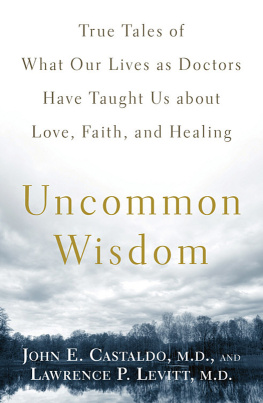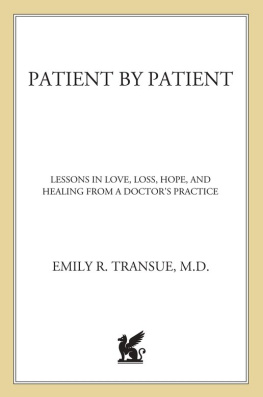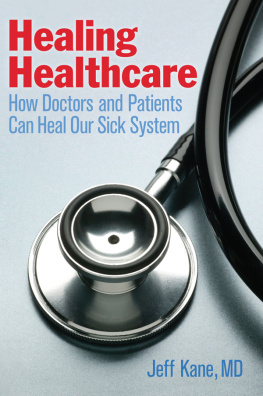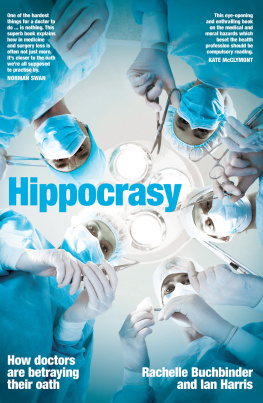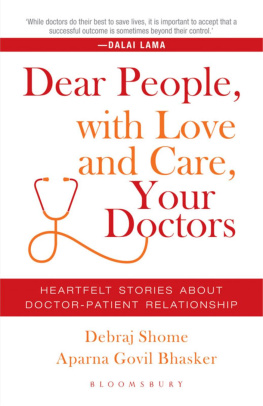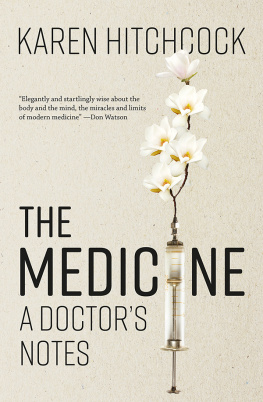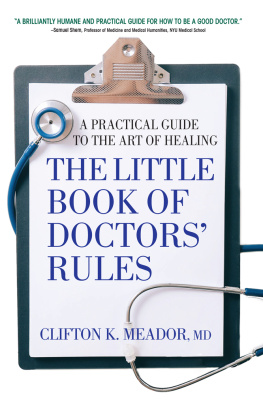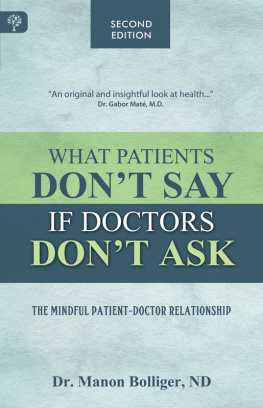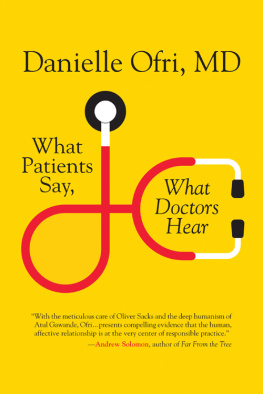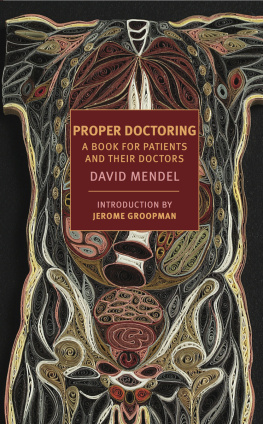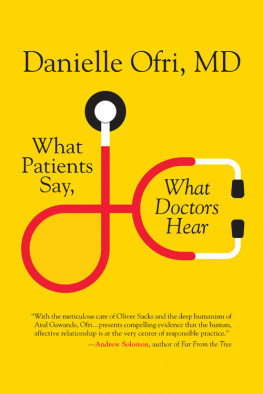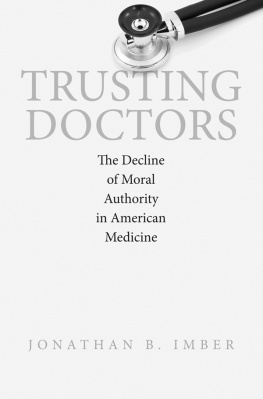What one learns from this book you wont find in any textbook of medicine that I ever read. These stories are less about disease and more about contextthe impact of an illness on the patients life, on the family, on the doctor, and even on the doctors family. I would urge physicians, those who have experienced serious illness in their families, and especially medical students to read this book. Hopefully what is uncommon will become common!
Andrew G. Wallace, M.D.
Dean Emeritus
Dartmouth School of Medicine
With some sixty years as practicing neurologists between them, Drs. Castaldo and Levitt have borne witness to the many dimensions of human struggle with severe illness. From this rich experience, they now share with us what it is to truly listen with compassion and how we may touch the lives of others by opening our own hearts. Throughout the book, we see how the sometimes hard lessons of love, hope, and humility expand us, and we experience the uncommon wisdom that resides in everyone, ready to be tapped in times of great challenge. This is truly a book that belongs in everyones library.
Frank M. Dattilio, Ph.D.
Department of Psychiatry
Harvard Medical School
Unencumbered by jargon, this clearly written book filled with compelling personal stories is a wonderful reminder of what the practice of medicine was meant to be. Its two physician authors are inspirational examples of the power of compassion and humility in a profession often accused of insensitivity and arrogance.
Dorothy Gulbenkian Blaney, Ph.D.,
Former President, Cedar Crest College
Joseph J. Blaney, Ph.D., Former Head,
United Nations International School
These are stories of the humanity of medicine. In a sense, they are old-fashioned, because they celebrate the relationship between doctor and patient as it has been at its best. But in another sense, they are timeless, because they tell of the human condition, and how we care for each other.
Sherwin B. Nuland, M.D.
Best-Selling Author and Clinical Professor of Surgery
Yale University
In the gloom that is frequently heard about the American health care system, this book is a ray of sunlight. There is nobility among American medical doctors and Drs. Levitt and Castaldo are shining examples of that nobility.
Edward Donley
Former Chairman of Air Products and Chemicals, Inc.
Drs. Castaldo and Levitt have written a book brimming with clinical wisdom and humanity. Their lovingly written stories of their patients case histories beautifully illuminate the lessons their patients have taught them about medicine and life. This volume is proof that contemporary physicians can practice using the highest technology testing and treatment yet remain caring, kind, ethical, and compassionate.
James L. Bernat, M.D.
Professor of Neurology
and Director of the Program in Clinical Ethics
Dartmouth-Hitchcock Medical Center
We dedicate this book to our parents, Lillian and William Castaldo and Esther and Morris Levitt, whose examples inspired us; to our wives, Karen and Eva, who have encouraged us; and to our children, David, Mark, Nicholas, Steph, Jeff, Adam, Marc, and Lora, who we hope will embrace the uncommon wisdom in these stories and allow it to enrich their lives as it has enriched ours.
C ONTENTS
We were gratified by the positive reaction to our book TheMan With the Iron Tattoo, first published by BenBella Books of Dallas, Texas, in 2006. We will always appreciate the efforts of Glenn Yeffeth, CEO, and his colleagues.
For Rodales edition, we added three chapters that follow the books theme of life lessons we learned from our patients. We also changed the title to Uncommon Wisdom: True Tales ofWhat Our Lives as Doctors Have Taught Us about Love, Faith,and Healing, which we think more accurately reflects what the book is about. We hope our readers enjoy the results.
J.E.C. and L.P.L.
T HIS BOOK IS ABOUT science and spirit; it is about the splendor of the human brain and the grace and courage of human beings in the face of daunting challenges. It is also about the ways in which people transform each other, often without ever knowing it.
We are neurologistsbrain doctorswho have been partners in a busy academic and clinical practice for twenty years. For many of those years, we chose to share a consultation office, which was furnished with one brown oak desk and two chairs. As our partnership and friendship deepened, we learned much from each other. Some of what we learned was about neurologyabout multiple sclerosis, Parkinsons disease, stroke, epilepsy, and other conditions that affect the brain, spinal cord, peripheral nerves, and muscles. These are diseases that can suddenly and dramatically shift a life: one day a patient is relatively normal; the next, he or she is unable to pick up a spoon, walk, speak, see. It is a world of harrowing difficulty and, sometimes, unexpected opportunity.
As we learned more about these neurological conditions and how to treat them, we began to realize that we were also gaining wisdom from our patientswisdom about how to live. We were also learning much from family members who often confronted wrenching change in a loved one, and therefore in their own daily roles and rhythms. We feel fortunate that relatively early in our lives, our patients and their families were willing to teach us lessons that we ourselves needed to learn.
And so, after writing numerous articles and book chapters for physicians, physicians-in-training, and medical students, we began to write of encounters with some of our patients, in plain language and, we hope, with honesty and directness. All of the cases presented here are true; some names and details have been changed to protect patient and family privacy.
While the stories that follow encompass a number of intriguing medical challenges, more essentially, they trace emotional and spiritual upheaval, turning points, and growth. We share with you, the reader, the fears, longings, sorrows, and satisfactions of being doctors, and the ways we have been profoundly changed by the people we have treated. Looking back, we realize that the uncommon wisdom that our patients have shared with us is founded on the values that our parents once tried to teach us, but perhaps at a time when we were not ready to truly listen. This wisdom, grounded in love, faith, forgiveness, and healing, is at the core of the book.
We hope that the stories youre about to read prove not merely interesting, but useful to you. For the book addresses an essential human question that extends far beyond matters of the brain: In the face of any enduring challenge, how do we live with joy and hope? It is a question we continue to ponder and learn about from our patients, colleagues, families, and friends. We invite you to join the conversation.
J.E.C. and L.P.L.
M RS . P OOL ? I SPOKE softly to the frail, gray-haired woman lying motionless on the bed. There was no response. Mrs. Pool? I ventured again. Can you tell me how youre feeling?
The sheets stirred slightly. Very weak, she finally whispered. She reached out to touch my hand, mumbled something unintelligible, and drifted off to sleep again, ending my interview before it really got started.
I was a first-year resident at Memorial Sloan-Kettering Cancer Center in New York City, and feeling frankly overwhelmed. I knew that Dorothy Pool had been recently diagnosed with lung cancer and had traveled to our hospital from her home in Allentown, Pennsylvania, after becoming suddenly and unaccountably weaker. Her doctors in Allentown couldnt figure out the source of her precipitous decline, which is why her husband, Leonard, had been advised to bring her to Sloan-Kettering. We were their last hope. Mr. Pool was sitting on a chair across from his wifes bed, looking up at me with a mixture of sadness and stoicism. I could imagine him thinking: Too young, too inexperienced. Wasting our time.

